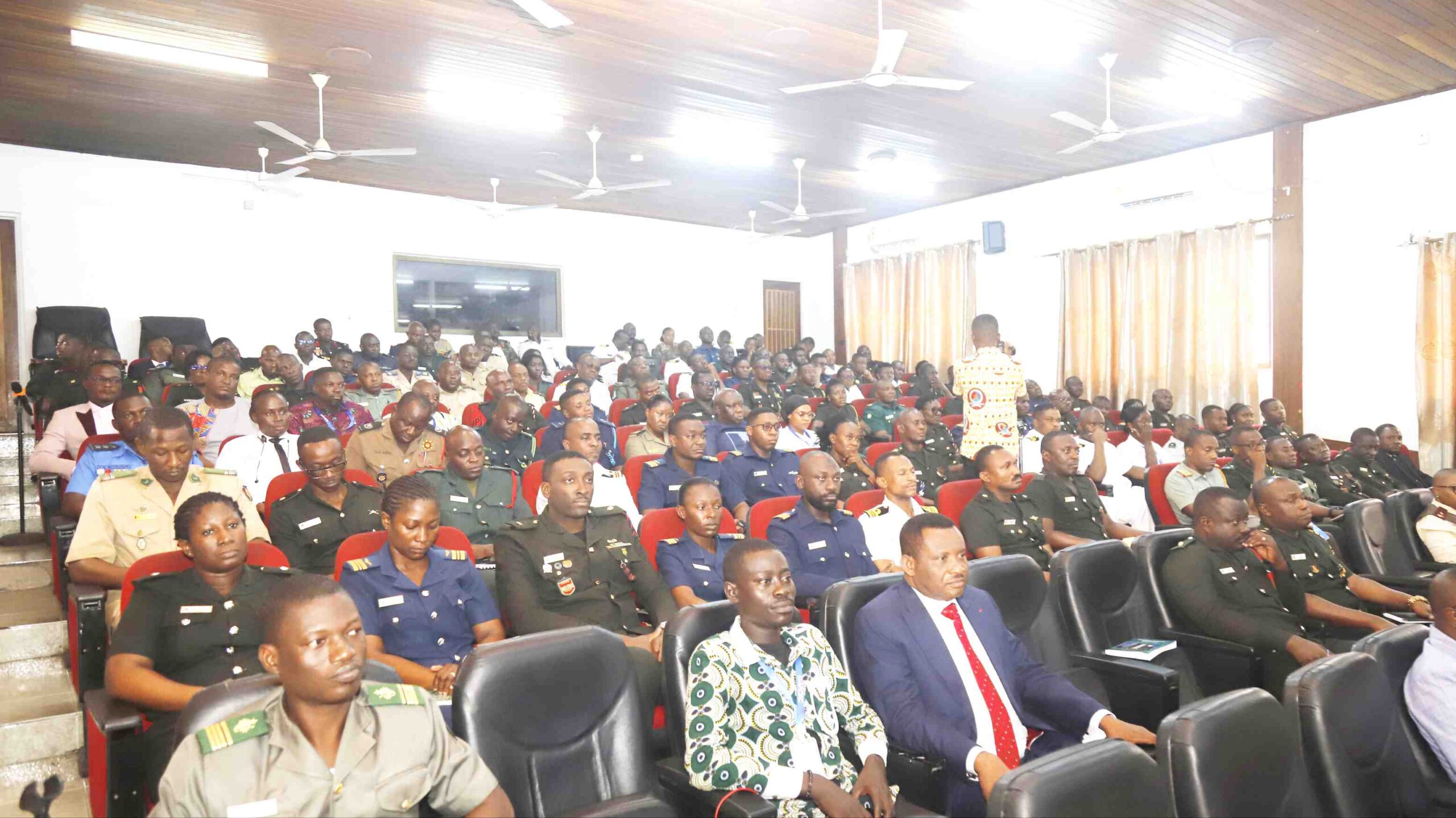“In an era where the boundaries between land, sub-surface, sea, air, space, electromagnetic spectrum and cyberspace are increasingly blurred and overlapping, it is imperative for African armed forces to evolve, adapt and excel in operating across these multiple domains seamlessly and effectively”, the Commandant of the Ghana Armed Forces Command and Staff College (GAFCSC) has stated, as the military college introduced a new course – Multi-Domain Operations (MDO).
The MDO, which was introduced as part of the modules packaged with the College’s Senior Command and Staff Course 45, commenced on Monday 27 May 2024, and ended on Friday June 14 2024, as one of its new concepts to warfare and approaches to military operations, to help shape the understanding of the continuously evolving nature of current military actions.

The Commandant, GAFCSC – Major General (Maj Gen) Matthew Kweku Essien, as the Chief Guest at the commencement ceremony, said the concept of MDO represents a paradigm shift in the way warfare is thought about and conducted, which hitherto was restricted to three traditional domains, and that it is the much-needed effort in providing the Armed Forces with the requisite knowledge base, to move the noble profession, in the direction needed to transform the nation.
Providing hints of what the course entails, General Essien said participants will be required to delve deep into the intricacies of Multi-Domain Operations, exploring the synergies, keystones and interdependencies among the various domains and the importance of integrating them to achieve both operational and strategic objectives.
He continued to say that, during the Module, participants will learn about the latest technologies, tactics, rationale and strategies that are reshaping the modern battle space, and how these can be leveraged to gain a competitive edge in conflicts of the future, regardless of how violent or otherwise it may be.

“These will help us develop not only the right acumen and posture, but also the penchant for enhancing the operational effectiveness of the Armed Forces, through research and development”, Maj Gen MK Essien said.
At the closing ceremony at the Ankrah Hall of GAFCSC, the Commandant spoke of how participants had delved into the complexities of modern warfare, explored the fusion of capabilities across land, sea, air, space, and cyberspace, and discussed the strategic implications of operating in a multi-domain environment.
Talking of future wars, General Essien said, it is evident that the future of warfare would demand agility, innovation, and integration across all domains to achieve success, and thus urged participants to adapt and be flexible, in the face of evolving threats and challenges. By embracing a comprehensive approach to operations and leveraging the strengths of each domain.
The objective of the MDO course were to develop participants to: 1) Understand the concept of MDO and its significance in modern warfare. Examine land, maritime, air power, cyber, and nuclear contributions to MDOs and posture for future wars; 2) Explore the factors that contribute to stress in operational commanders, such as high-stakes decision making, operational tempo, and exposure to traumatic events;

3) Discuss common psychological challenges faced by operational commanders, such as decision fatigue, moral injury, and post-traumatic stress; 4) Examine the technological landscape shaping future wars, including emerging technologies such as Al, robotics, cyber capabilities, and hypersonic weapons;
5) Analyse operational design considerations specific to multi- domain operations, including joint operations, operational environment, assessment, and conceptualizing operational design; 6) Discuss strategies for fostering a psychologically safe and supportive command climate;
7) Evaluate command and control structures in the context of multi- domain operations, including decentralized command, centralized command, and leveraging technology for real-time decision-making; 8) Investigate the role of information warfare and influence operations in modern conflicts, including cyberspace operations, psychological operations, and ethical considerations.

9) Assess the challenges and opportunities of joint force integration in multi-domain operations, including interoperability among different military branches and partner nations; 10) Explore strategies for countering hybrid warfare tactics and adapting to non-traditional threats and actors;
11) Forecast future trends in warfare and scenario planning for multi domain operations, considering geopolitical shifts and technological advancements; 12) Apply concepts learned throughout the course in an exercise, simulating a multi-domain operation scenario, and derive lessons learned for future military planning and operations.
The participants of the MDO Course were Ninety-eight (98) Officers/students of seventeen African Armed Forces, and constituents of GAFCSC’s Senior Staff Course 45, gunning for the esteemed college’s prestigious Master of Science (MSc) in Defence and International Politics (MDIP), being trained for eleven months in Command and Staff responsibilities, and are to be awarded past staff college – ‘psc’, upon successful graduation.

The 98 students/Officers are from Benin, Burkina Faso, Botswana, Cote d’Ivoire, Gambia, Ghana, Guinea, Liberia, Malawi, Nigeria, Namibia, Rwanda, Sierra Leone, South Africa, Togo, Tanzania and Zambia.
There were also external participants besides the MDIP and Senior Staff Course 45, and they were honoured with their certificates of participation, during the closing ceremony.
Present at the opening ceremony included the Deputy Commandant – Brigadier General Abass Seidu; Assistant Commandant, Senior Division – Air Commodore Nii Fio Okai; Dean of Academic Affairs – Dr Vladimir Antwi-Danso; Chief Coordinator – Colonel Maxwell Mantey; Chief Instructor Joint Studies – Colonel William Kwabiah; Chief Instructors, Members of the Directing Staff.
By Kofi Ampeah-Woode
